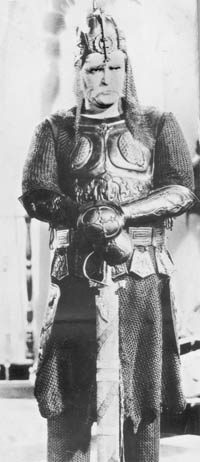|
Master artiste
Paramjit
Singh on the legendary Prithviraj Kapoor, whose
death
anniversary falls today

Prithviraj Kapoor’s performance as Akbar in Mughal-e-Azam remains unparalleled |
Prithviraj Kapoor,
popularly known as Papaji, had an abundance of talent and tons
of affection for his juniors. He is revered even today for his
matchless performance in K. Asif’s Mughal-E-Azam.
Prithvi was born on November 3, 1906, to Basheshar Nath Kapoor’s
first wife — a deeply religious and sweet-natured woman. He
studied in different schools at Samundri and Lyallpur and later
did graduation from Peshawar. Six feet tall and handsome, this
young man had no urge for acting.
It was while
studying law at Government College, Lahore, he developed a taste
for acting and soon this liking became his passion. So much so
that he left his wife Rama Devi and son Raj at Peshawar and
reached Mumbai to showcase his talent to the world.
In Mumbai, he had
to struggle a lot until one fine day when Ardeshir Irani, owner
of Imperial Film Company selected him as an ‘extra’. Prithvi
acted in his debut film Challenge as a junior artist.
Irani was impressed with Prithvi’s acting and signed him as
hero for his next film Cinema Girl (1929).
The film worked
wonders at the boxoffice followed by a long line of super hits
like Toofan, Draupadi, Bid for the Throne, Noorani Moti,
Lohar ki Beti, Dharti Mata, Namak Haram Kaun and Prem ka
Daav. All these movies were silent movies but when the genre
of talkies came into existence, he earned the honour of working
on the first film of this genre i.e. Alamara (1931).
In 1932, he was
called to Calcutta by the owners’ of New Theatres to join it
at the salary of Rs 450 per month. Here he scaled the peak of
success as an actor and did his career defining roles in films
like Meera, Daku Mansoor, Manzil, Presedent, Anaath Ashram,
Vidyapati, Abhagin, Dushman, Sapera, Ramayan, Jeevan Prabhat and
Milap.
In 1939, Prithvi
moved to Mumbai to work for Ranjit Movietone at the salary Rs
1000 per month. His first film with this company was Adhoori
Kahani, in which Durga Khote was the heroine. For the next
34 years, he served the same company and he spawned a number of
hits like — Aaj Ka Hindustan, Paagal, Gauri, Vish
Kanya, Deepak, Sajni, Chingari, Rajnartki, Sikander, Ek Raat,
Ujala and Ishara.
After 1944, he
tried his hand at mythological films and hit the bull’s eye
again. His constant success in films like Maharathi Karan,
Devdasi, Shri Krishan Yudh, Vikramaditya, Shivaji, Valmiki,
Parshuram, Prithviraj-Sanjogita, Ram-Bharat Milap, Harish
Chandra-Taramati, Jahan Aara, Sikander-E-Azam, Laajwanti, Dahej,
Pardersi, Paisa, Aazadi ki Raah Par, Naag Panchmi and Sati
Sulochana aided him well in gathering abundant applause from
the viewers. He rode the crest of box-office success with Mughal-E-Azam
(1960) in which he played the role of Mughal Emperor Akbar.
In the final phase
of his life and career, he did certain ‘C-grade’ films like Lutera,
Daaku Mangal Singh, Lal Bangla, Baanke Lal, Love and Murder
along with a few hits like — Ghazal, Raajkumar, Zindgi,
Jaanwar, Kal Aaj aur Kal, Insaaf ka Mandir, Teen Bahuranian, Ye
Raat Phir na Ayegi.
Prithviraj Kapoor
remained a Member of Parliament (Rajya Sabha) from 1952 to 1960.
In 1963, he was awarded Padma Bhushan and later in 1973
Dadasaheb Phalke Award was also conferred on him (posthumously).
On May 29, 1972, he passed away leaving a void in every heart.

|